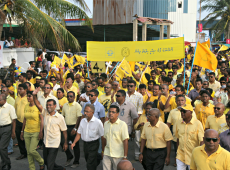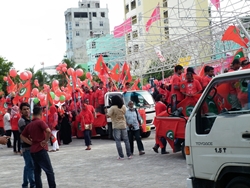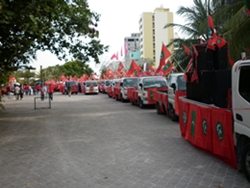The Police Integrity Commission (PIC) has refused to investigate the confidential police forensic report – based on which the Supreme Court annulled the first round of the 2013 presidential election – because it could cast doubt on the legitimacy of the ruling, the Elections Commission has said.
Speaking at the People’s Majlis Commitee on Independent Institutions, EC member Mohamed Farooq said that the commission noticed serious issues in the Maldives Police Service (MPS) forensic report. According to Farooq, the EC found that many among the people who were considered deceased based on the forensic report were actually alive.
When the EC requested for the court’s permission to include those people in the eligible voters list, the court responded saying it did not declare anyone dead and the annulment of first round of elections was based on the police forensic report, Farooq said.
“Then we realised that it was more of a issue with the forensic report than the Supreme Court. And since it was prepared by the police, we submitted a complaint to the Police Integrity Commission, because they produced such a faulty report,” Farooq was quoted as saying in CNM.
Fraudulent allegations
According to Farooq, the PIC responded to the complaint saying that if a decision is made on the forensic report it could raise questions about the legitimacy of that case, and therefore the commission will not decide on the matter nor will they investigate the case further.
In the first round of elections former President Mohamed Nasheed of the Maldivian Democratic Party (MDP) came first with 45.45 percent. President Abdulla Yameen of the Progressive Party of Maldives (PPM) came second with 25.35 percent, and the Jumhooree Party’s Qasim Ibrahim came third with 24.07 percent of the vote.
Qasim subsequently filed a case at the apex court citing fraud and vote rigging in the election. On October 7, the Maldives Supreme Court annulled the first round.
The 4:3 verdict cited a confidential police report submitted to the court alleging 5,600 ineligible votes. It was said to be compiled by a team of MPS ‘forensic experts’ who worked inside the Supreme Court premises collecting and analysing evidence of the alleged vote rigging.
Later, when the People’s Majlis ‘241’ security services oversight committee requested for the report, then Commissioner of Police Abdulla Riyaz declined. The parliament have still not officially received the report, however a copy of the document was obtained and published by Minivan News.
Report’s impact could be huge: MP Sameer
The report was later shared with the EC, who will now review it and submit a report to the People’s Majlis Committee on Independent Institutions.
Speaking to Minivan News today, the committee chair MP Ahmed Sameer said the group would review the EC report and take necessary action.
“The impact of this report is huge. If there is something wrong with the report we will have to look into it. It shall be discussed in the Majlis,” Sameer said.
The three dissenting judges in the Supreme Court case, Chief Justice Ahmed Faiz, Justice Abdulla Areef and Justice Muthasim Adnan in their dissenting opinion dismissed the confidential police report submitted by the Attorney General Azima Shakoor as invalid evidence as EC was not provided a right of response to the document.
The majority decision of court based on the secret police report cited 5,623 ineligible votes, while Faiz and Areef, after a comparison between the EC’s list of those who voted and the Jumhooree Party’s seven lists alleged of dead, underage, and repeated voters found only 473 cases (0.2 percent of votes) of irregular votes.
The two judges also stated that election laws do not allow for annulling the entire election in instances of fraud, and all three dissenting judges challenged the apex court’s constitutional jurisdiction over the case.
The confidential police report was also dismissed by the United Nations after an expert review of the document. “We feel confident in asserting that the election was all inclusive, there was no disenfranchisement and the quality of the voter register met international standards,” read a statement from UN Assistant Secretary-General for Political Affairs Oscar Fernandez-Taranco following his visit to the Maldives stated
Other local and international election observers, among them Commonwealth and Indian observers, also praised the conduct of elections, considering it free and fair.
Some people claimed to be underage in the secret police report were later found to be of voting age at the time, and some declared deceased in the report found to be alive.




